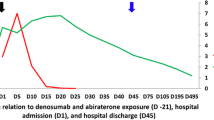Summary
Cabozantinib is a multikinase inhibitor approved for the treatment of metastatic medullary thyroid cancer and advanced renal cell carcinoma (RCC) in patients who have received prior anti-angiogenic therapy. While associations between serum creatine kinase (CK) elevations and other tyrosine kinase inhibitors used for the treatment of solid malignancies have been previously reported, we report a case of cabozantinib-associated CK elevation that was associated with musculoskeletal complaints by an RCC patient. Nine days following initiation of cabozantinib, the patient reported muscle cramps and serum CK had increased from levels 12 months earlier that were within normal limits to a grade 1 elevation of 244 units/L. Despite a dose reduction, her CK continued to rise over the next 2 months, leading to a peak CK of 914 units/L. Due to this grade 3 elevation, cabozantinib was permanently discontinued, and her CK subsequently returned to a grade 1 elevation within one week and then to baseline within 3 weeks. The temporal relationship between drug exposure and CK increase strongly suggests causality. To the authors’ knowledge, this is the first reported case of CK elevation attributed to cabozantinib, but cabozantinib-induced CK elevations could be under-reported, and providers should monitor for musculoskeletal complaints during cabozantinib therapy.
Similar content being viewed by others
References
Hsieh J, Purdue M, Signoretti S et al (2017) Renal cell carcinoma. Nat Rev Dis Primers 3:17009
Siegel R, Miller K, Jemal A (2018) Cancer statistics. CA Cancer J Clin 68(1):7–30
Cometriq® [package insert]. South San Francisco: Exelixis, Inc.; 2018
Cabometyx® [package insert]. South San Francisco: Exelixis, Inc.; 2018
“FDA grants regular approval to Cabometyx for first-line treatment of advanced renal cell carcinoma.” FDA.gov . U.S. Food and Drug Administration, 19 December 2017. Web. 26 April 2018. <https://www.fda.gov/Drugs/InformationOnDrugs/ApprovedDrugs/ucm589842.htm>
Choueiri T, Escudier B, Powles T et al (2016) Cabozantinib versus everolimus in advanced renal cell carcinoma (METEOR): final results from a randomised, open-label, phase 3 trial. Lancet Oncol 17:917–927
Choueiri T, Halabi S, Sanford B et al (2017) Cabozantinib versus sunitinib as initial targeted therapy for patients with metastatic renal cell carcinoma of poor or intermediate risk: the alliance A031203 CABOSUN trial. J Clin Oncol 35:591–597
Ko J, Xie W, Kroeger N et al (2015) The international metastatic renal cell carcinoma database consortium model as a prognostic tool in patients with metastatic renal cell carcinoma previously treated with first-line targeted therapy: a population-based study. Lancet Oncol 16(3):293–300
National Cancer Institute, National Institutes of Health, U.S. Department of Health and Human Services. Common Terminology Criteria for Adverse Events v4.03. 2010; NIH publication # 09–7473
Morandi L, Angelini C, Prelle A et al (2006) High plasma creatine kinase: review of the literature and proposal for a diagnostic algorithm. Neurol Sci 27(5):303–311
Franceschino A, Tornaghi L, Benemacher V et al (2008) Alterations in creatine kinase, phosphate and lipid values in patients with chronic myeloid leukemia during treatment with imatinib. Haematologica 93(2):317–318
Gordon J, Magid S, Maki R et al (2010) Elevations of creatine kinase in patients treated with imatinib mesylate (Gleevec). Leuk Res 34(6):827–829
Penel N, Blay J, Adenis A (2008) Imatinib as a possible cause of severe rhabdomyolysis. N Engl J Med 358(25):2746–2747
Adenis A, Bouche O, Bertucci F et al (2012) Serum creatine kinase increase in patients treated with tyrosine kinase inhibitors for solid tumors. Med Oncol 29:3003–3008
Giampietro O, Clerico A, Buzzigoli G et al (1984) Detection of hypothyroid myopathy by measurement of various serum muscle markers—myoglobin, creatine kinase, lactate dehydrogenase and their isoenzymes. Correlations with thyroid hormone levels (free and total) and clinical usefulness. Horm Res 19(4):232–242
Beyer I, Karmali R, Demeester-Mirkine N et al (1998) Serum creatine kinase levels in overt and subclinical hypothyroidism. Thyroid 8(11):1029–1031
Hekimsoy Z, Oktem I (2005) Serum creatine kinase levels in overt and subclinical hypothyroidism. Endocr Res 31(3):171–175
Moghadam-Kia S, Oddis C, Aggarwal R (2016) Approach to asymptomatic creatine kinase elevation. Cleve Clin J Med 83(1):37–42
Naranjo C, Busto U, Sellers EM et al (1981) A method for estimating the probability of adverse drug reactions. Clin Pharmacol Ther 30:239–245
Acknowledgments
The authors would like to thank Dr. Lana Crona and Ms. Sara Pettaway for their help in editing this short report.
Author information
Authors and Affiliations
Contributions
S.E.S., D.J.C., and Y.E.W. all contributed equally in the conception, writing, editing and approval of this short report.
Corresponding author
Ethics declarations
Conflict of interest
Y.E.W. received research funding from Astellas and Janssen and Tokai. S.E.S. and D.J.C. stated no conflicts of interest.
Ethical approval
All procedures performed in studies involving human participants were in accordance with the ethical standards of the institutional and/or national research committee and with the 1964 Helsinki declaration and its later amendments or comparable ethical standards.
Rights and permissions
About this article
Cite this article
Stump, S.E., Whang, Y.E. & Crona, D.J. Cabozantinib-induced serum creatine kinase elevation and musculoskeletal complaints. Invest New Drugs 36, 1143–1146 (2018). https://doi.org/10.1007/s10637-018-0629-2
Received:
Accepted:
Published:
Issue Date:
DOI: https://doi.org/10.1007/s10637-018-0629-2




